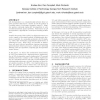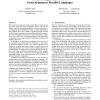1099 search results - page 87 / 220 » A Parallel Programming Style and Its Algebra of Programs |
162
Voted
PPOPP
2009
ACM
16 years 3 months ago
2009
ACM
Recent advances in polyhedral compilation technology have made it feasible to automatically transform affine sequential loop nests for tiled parallel execution on multi-core proce...
250
click to vote
ASPLOS
2009
ACM
16 years 3 months ago
2009
ACM
QR decomposition is a computationally intensive linear algebra operation that factors a matrix A into the product of a unitary matrix Q and upper triangular matrix R. Adaptive sys...
129
Voted
ICFP
2008
ACM
16 years 2 months ago
2008
ACM
The trend in microprocessor design toward multicore and manycore processors means that future performance gains in software will largely come from harnessing parallelism. To reali...
138
click to vote
ASPLOS
2010
ACM
15 years 7 months ago
2010
ACM
Heterogeneous computing combines general purpose CPUs with accelerators to efficiently execute both sequential control-intensive and data-parallel phases of applications. Existin...
130
Voted
COORDINATION
2009
Springer
16 years 3 months ago
2009
Springer
A future is a well-known programming construct used to introduce concurrency to sequential programs. Computations annotated as futures are executed asynchronously and run concurren...


